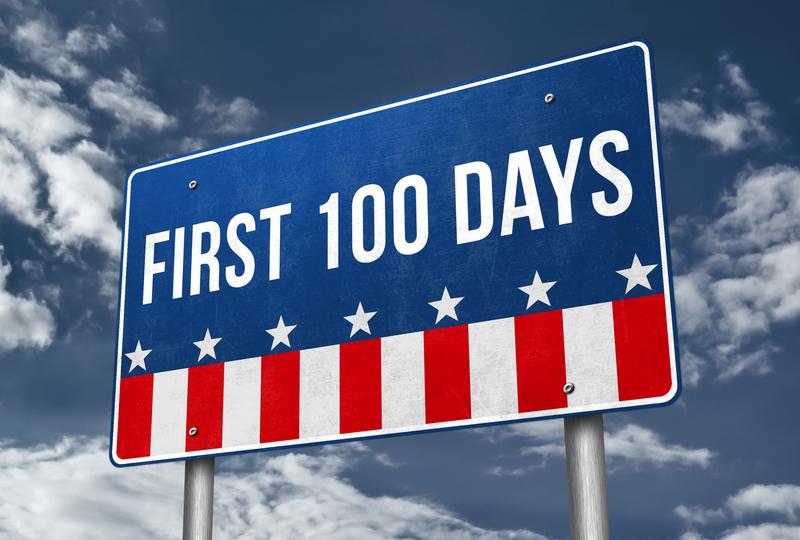On January 20, 2021, Joseph R. Biden made history as he was sworn in as the 46th President of the United States. After the Inauguration, he made his way to The White House to begin his “First 100 Days” in office.
Why are the “First 100 Days” in office so significant? The “First 100 Days” was exercised initially by Franklin Delano Roosevelt (FDR), who came into the office and made sweeping reform to combat the effects of the Great Depression. During this time, his administration was extremely productive in rolling out new programs and passing legislation. It also set the tone for all of his predecessors.
Now, when a newly elected President takes office, the “First 100 Days” are his, or someday her, chance to make good on all of those campaign promises as well as address any crises the country may be facing, just like in the days of FDR.
In 2021, President Joe Biden has a pretty full plate: the continuing COVID-19 pandemic, unemployment, climate change, and racial injustice – just to name a few. However, future and current college students, in addition to student loan borrowers, are wondering what Biden’s “First 100 Days” will mean for them. Fortunately, the new President is taking steps to address issues that students nationwide are facing.
Biden’s Plan for Student Borrowers
First things, first. If you follow the headlines at all, you may have seen that Democratic Senators were calling on Biden to forgive all student loan debt during his First 100 Days. Although that would have been nice for millions of borrowers, the newly elected President rejected the calls for complete forgiveness. He is, however, hoping to pass legislation that would eliminate $10,000 in student loan debt for every borrower. The only caveat here is that this proposal needs to pass through Congress first. President Biden has been able to postpone student loan payments for the next eight months for borrowers that require relief, according to a press release from the U.S. Department of Education. The administration has also decided to keep student loan interest rates at 0%, which is especially of note to those high school seniors or college students borrowing federal loans in order to pay for college next year.COVID-19 and Reopening Colleges
Since taking office, President Biden has stated many times how important it is to get students back in school. According to Inside Higher Ed, Biden signed an executive order directing the Secretary of Education and the Secretary of Health and Human Services to provide “evidence-based guidance to institutions of higher education on safely reopening for in-person learning, which shall take into account considerations such as the institution’s setting, resources, and the population it serves.” The argument for this guidance is that the Center for Disease Control (CDC) has provided guidelines for colleges reopening; however, it’s lacking in specificity. Additionally, no college is the same, which means that guidelines are going to differ widely. The Biden Administration believes that colleges and universities will benefit greatly from more streamlined, specific guidelines, reports Inside Higher Ed. These directives would also include more guidance for on-campus COVID testing, requiring campuses to test students when they arrive for spring semester as well as every two weeks after. With these types of directives in place, colleges would need the resources to safely do just that. President Biden is hoping to provide colleges with those resources as part of his $1.9 trillion COVID relief bill. Approximately $35 billion would go to colleges and universities across the country, including public colleges, community colleges, Historically Black Colleges and Universities (HBCUs), and other Minority-Serving Institutions (MSIs), states U.S. News and World Report. This fund would help colleges institute regular testing in addition to further financial assistance for students in the form of grants.DACA Students Could Receive Financial Aid
DACA, which stands for Deferred Action for Childhood Arrivals, was established during the Obama Administration and protects immigrants who were brought to the country illegally as children. Through the program, they can be protected from deportation and receive a work permit as well as continue down a path toward legal citizenship. The Trump Administration worked to dismantle the program and stopped taking applications during the summer of 2020. Biden, however, is working to overturn many of the Trump-era policies on immigration, particularly to DACA. President Biden is working toward providing immigrants with DACA with the ability to apply for green cards right away. If he is successful, this would make those in DACA eligible for federal financial aid and state grants, according to Higher Ed Dive. Proponents of this legislation say it will also help to encourage international students to study in the U.S., which declined in number during the Trump presidency as well.More College Changes to Come?
President Biden is just a few weeks into his “First 100 Days.” We could see more changes coming to higher education over the next two months as well; after the President has addressed some of the more pressing issues of our time. While he was campaigning, the President’s Plan for Higher Education was three-fold:- Invest in community colleges and improve student success rates.
- Make public, in-state college tuition free for all families making less than $125,000 a year.
- Support HBCUs and MSIs with more funding and make them more affordable for students.
